In immune research, Thymalin vs Thymosin Alpha-1 are two peptides with significant potential for modulating immune function. These peptides are derived from the thymus gland and play a vital role in supporting the immune system. They help the body fight infections, regulate inflammation, and may even treat chronic diseases.
However, Thymalin and Thymosin Alpha-1 differ in their modes of action, structure, and research applications. Understanding these differences is crucial for researchers when selecting which peptide to study or use.
This article will explore the differences between Thymalin vs Thymosin Alpha-1. We will examine their molecular composition, biological activity, and specific research uses. We will also discuss the broader implications of these peptides in immune system regulation and offer insights into their therapeutic potential.
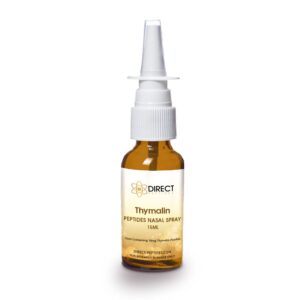 Thymalin is a peptide mixture extracted from the thymus gland. The thymus is responsible for producing T-cells, which play a pivotal role in the immune system. These cells help to recognize and destroy infected or cancerous cells.
Thymalin is a peptide mixture extracted from the thymus gland. The thymus is responsible for producing T-cells, which play a pivotal role in the immune system. These cells help to recognize and destroy infected or cancerous cells.
Thymalin has been shown in various research studies to stimulate the production and regeneration of T-cells, especially in aging or immunocompromised organisms. By promoting T-cell production, Thymalin can potentially rejuvenate the immune system.
This helps restore its ability to respond effectively to pathogens. This makes Thymalin an essential tool in studies of aging, immunodeficiency, and immune regeneration. In animal models, Thymalin has been shown to counteract the effects of immune system aging. It allows the body to mount more robust immune responses against infections.
Furthermore, Thymalin has shown promise in studies related to immune restoration. Researchers are exploring how Thymalin could be used to treat chronic infections or even support recovery from certain cancers. By boosting the body’s immune system, Thymalin helps it regenerate and fight off diseases.
Boost immune regeneration with Thymalin Peptides from Direct Peptides Netherlands, stimulating T-cell production for better immune response.
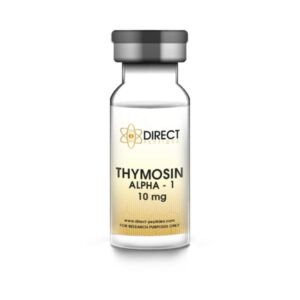 On the other hand, Thymosin Alpha-1 is a specific peptide derived from the thymus. Unlike Thymalin, it is a single peptide rather than a mixture. Thymosin Alpha-1 has gained attention in research due to its ability to modulate immune responses. It does this mainly by stimulating cytokines—small proteins that help coordinate immune cell behavior.
On the other hand, Thymosin Alpha-1 is a specific peptide derived from the thymus. Unlike Thymalin, it is a single peptide rather than a mixture. Thymosin Alpha-1 has gained attention in research due to its ability to modulate immune responses. It does this mainly by stimulating cytokines—small proteins that help coordinate immune cell behavior.
The main function of Thymosin Alpha-1 in immune regulation is to increase cytokine production. Cytokines play a central role in regulating immune responses by activating immune cells such as T-cells, macrophages, and natural killer cells.
By stimulating cytokine production, Thymosin Alpha-1 enhances immune responses. It helps the body fight chronic infections, autoimmune diseases, and even cancer.
Because of its targeted immune modulation, Thymosin Alpha-1 has been studied extensively for its potential in treating conditions like hepatitis, HIV, and cancers.
Unlike Thymalin, which mainly focuses on regenerating immune cells, Thymosin Alpha-1 fine-tunes the immune system. It makes the immune system more efficient in fighting infections and regulating immune cell activity.
Enhance immune modulation with Thymosin Alpha-1 from Direct Peptides Netherlands, optimizing cytokine production to fight infections and disease.
When comparing Thymalin vs Thymosin Alpha-1, there are several critical differences that researchers should know. These differences can influence how each peptide is used in research and therapeutic settings.
The most obvious difference between Thymalin vs Thymosin Alpha-1 lies in their molecular composition. Thymalin is a mixture of several peptides, which allows it to act on multiple immune pathways simultaneously.
This broad effect can enhance immune function in various ways. In contrast, Thymosin Alpha-1 is a single peptide, making its function more targeted. It focuses on immune modulation through cytokine production.
Explore Peptide Supplies at Direct Peptides Netherlands for all your reconstitution requirements.
While both peptides play important roles in immune system modulation, they do so in different ways. Thymalin enhances immune regeneration by stimulating T-cell production. T-cells are crucial for recognizing and responding to pathogens.
Thymosin Alpha-1, on the other hand, regulates immune cell activity by stimulating cytokine production. This helps to fine-tune the immune system’s responses.
In essence, Thymalin restores immune function, particularly through T-cell regeneration. Meanwhile, Thymosin Alpha-1 acts as an immune modulator by adjusting the immune response to infections and diseases.
In terms of research applications, Thymalin is typically studied for its regenerative effects on the immune system. It is ideal for studies focusing on immune restoration, especially for immunodeficient or aging populations.
Research on Thymalin has shown its potential to stimulate the production of new T-cells. This is especially crucial when the immune system is weakened or underperforming.
Thymosin Alpha-1, however, is more often used in research on immune modulation. Its role in stimulating cytokine production makes it invaluable for studying chronic infections, autoimmune diseases, and cancer treatments.
Thymosin Alpha-1 has been studied for its potential to enhance immune responses to persistent infections like HIV and hepatitis. It also regulates immune cell responses in cancer therapies.
The regenerative capacity of Thymalin makes it particularly valuable in research on aging and immune dysfunction. As we age, the thymus naturally shrinks, which leads to a decline in T-cell production. This contributes to a weakened immune system and a reduced ability to respond to infections.
By promoting the production of T-cells, Thymalin helps reverse some of the immune system’s age-related deficiencies. In animal studies, Thymalin has been shown to restore the production of immune cells.
This improves the body’s immune response to pathogens and reduces the risk of infections. This makes Thymalin a key peptide for research on age-related immune decline and immunodeficiencies.
Thymosin Alpha-1 excels in immune modulation, especially in conditions where the immune system is dysfunctional or underactive. Rather than regenerating immune cells, Thymosin Alpha-1 enhances immune function by stimulating cytokine production. This makes it especially useful in treating chronic infections, autoimmune diseases, and even cancer.
For example, Thymosin Alpha-1 has been shown to enhance immune function in individuals with chronic infections like hepatitis B and C. It helps the immune system better recognize and attack the virus.
Additionally, it has been studied for its potential to regulate immune responses in cancer patients. This boosts the immune system’s ability to fight cancer cells and improve the effectiveness of cancer therapies.
Apart from Thymalin and Thymosin Alpha-1, several other peptides are being studied for their potential effects on immune function. TB500 and LL-37 are two such peptides that have garnered interest in the scientific community.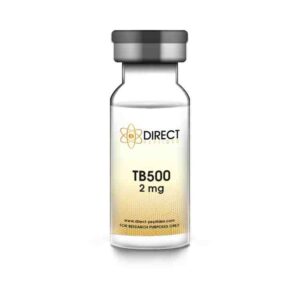
When deciding between Thymalin vs Thymosin Alpha-1 for your research, consider the goals of your study. Thymalin is ideal for research focused on immune regeneration and T-cell production.
This is especially true for aging or immunocompromised populations. Thymosin Alpha-1, on the other hand, is better for immune modulation. It is particularly useful in chronic infections, autoimmune diseases, and cancer therapies.
Both peptides offer distinct benefits in immune research. Understanding these differences will help researchers choose which peptide to study. Whether you want to regenerate immune function with Thymalin or modulate immune responses with Thymosin Alpha-1, both peptides play key roles in advancing immune system health.
[1] Khavinson VK, Linkova NS, Chalisova NI, Ivko OM. The Use of Thymalin for Immunocorrection and Molecular Aspects of Biological Activity. Biol Bull Rev. 2021;11(4):377–82.
[2] Reggiani PC, Schwerdt JI, Console GM, Roggero EA, Dardenne M, Goya RG. Physiology and therapeutic potential of the thymic peptide thymulin. Curr Pharm Des. 2014;20(29):4690-6.
[3] Dominari A, Hathaway Iii D, Pandav K, Matos W, Biswas S, Reddy G, Thevuthasan S, Khan MA, Mathew A, Makkar SS, Zaidi M, Fahem MMM, Beas R, Castaneda V, Paul T, Halpern J, Baralt D. Thymosin alpha 1: A comprehensive review of the literature. World J Virol. 2020 Dec 15;9(5):67-78.
[4] Malinda KM, Sidhu GS, Mani H, Banaudha K, Maheshwari RK, Goldstein AL, Kleinman HK. Thymosin beta4 accelerates wound healing. J Invest Dermatol. 1999 Sep;113(3):364-8.
[5] Bhattacharjya S, Zhang Z, Ramamoorthy A. LL-37: Structures, Antimicrobial Activity, and Influence on Amyloid-Related Diseases. Biomolecules. 2024 Mar 8;14(3):320.
Shop ALL Peptide Vials from Direct Peptides Netherlands today, your trusted supplier of premium clinical grade peptides online.
Neither peptide is universally better. Thymalin is more suitable for studies focused on immune regeneration and long-term restoration of T-cell function. Thymosin Alpha-1 is better suited for research that requires targeted immune modulation through cytokine signaling. The better option depends on whether the research goal is immune rebuilding or immune response control.
For immune health research, the choice depends on the scope. Thymalin supports broad immune system restoration by promoting T-cell renewal. Thymosin Alpha-1 supports immune health by regulating immune signaling and coordination. Thymalin aligns with regeneration models, while Thymosin Alpha-1 aligns with immune efficiency and response regulation models.
Thymosin Alpha-1 typically produces faster immune signaling effects because it directly influences cytokine activity and immune communication pathways. Thymalin works more gradually by supporting immune cell regeneration over time. Studies describe Thymosin Alpha-1 as acting on immune function, while Thymalin supports structural immune recovery that develops more slowly.
Yes, Thymalin is considered more regenerative based on research describing its role in stimulating T-cell production and immune system restoration. Thymosin Alpha-1 does not primarily regenerate immune cells. Instead, it enhances how existing immune cells communicate and respond. This distinction places Thymalin in regeneration-focused research and Thymosin Alpha-1 in modulation-focused research.
Research most often associates Thymosin Alpha-1 with chronic immune challenges rather than acute immune responses. Its primary role is to regulate immune signaling, restore immune balance, and improve immune coordination over time. Thymalin aligns more with rebuilding immune capacity, while Thymosin Alpha-1 aligns with managing prolonged or persistent immune dysfunction.
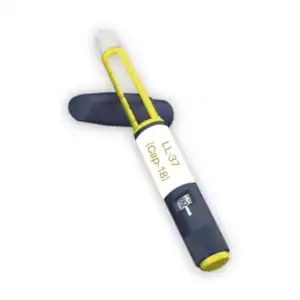
LL-37 (Cap-18) Pre-Mixed Pen 5mg
£45.25 – £122.18Price range: £45.25 through £122.18 Select options This product has multiple variants. The options may be chosen on the product page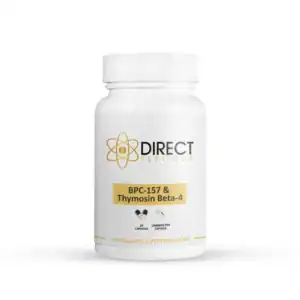
BPC-157 Thymosin Beta-4 Capsules
£148.73 Select options This product has multiple variants. The options may be chosen on the product page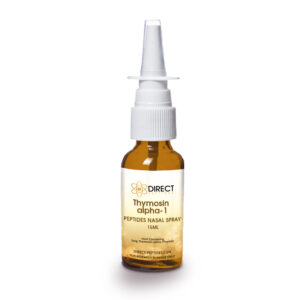
New Reduced Price
New Reduced Price
Thymosin Alpha-1 Nasal Spray
£64.25 – £123.50Price range: £64.25 through £123.50 Select options This product has multiple variants. The options may be chosen on the product page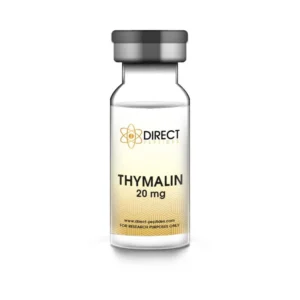
Thymalin Peptide Vial
£29.39 – £166.47Price range: £29.39 through £166.47 Select options This product has multiple variants. The options may be chosen on the product pageALL CONTENT AND PRODUCT INFORMATION AVAILABLE ON THIS WEBSITE IS FOR EDUCATIONAL PURPOSES ONLY.
DISCLAIMER: These products are intended solely as a research chemical only. This classification allows for their use only for research development and laboratory studies. The information available on our Netherlands Direct Peptides website: https://direct-peptides.com is provided for educational purposes only. These products are not for human or animal use or consumption in any manner. Handling of these products should be limited to suitably qualified professionals. They are not to be classified as a drug, food, cosmetic, or medicinal product and must not be mislabelled or used as such.